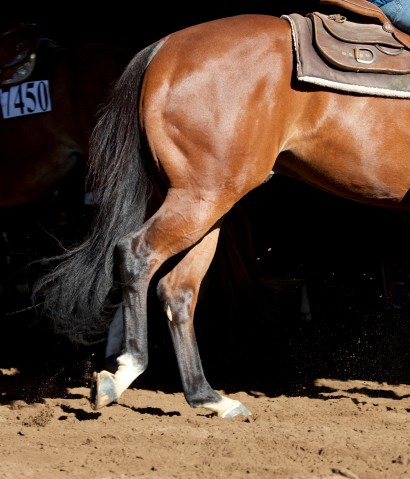Clicking Joints in Horses – Understanding Noisy Joints
Updated March 21, 2025

Why a horse has “clicking of the joints” is a common question amongst horse owners and riders. The sound usually originates from the back legs, in the hocks or fetlocks.
Why Horses Joints Click
In most cases, clicking joints are related to immaturity, lack of conditioning, and sometimes the size of the horse. It could indicate joint issues or be completely insignificant and harmless, so it’s important to work with your veterinarian to determine if your horse is experiencing problems or not. Rarely, the clicking may be associated with OCD, but this is not usually the case.
The mechanism of the clicking sounds is the subject of a lot of speculation and some research. Think of the people you know who can crack their knuckles! It’s the same thing. If you cause a closed hydraulic system to suddenly expand by stretching the membrane, there isn’t enough fluid to fill the space. So, oxygen will form bubbles, come out of solution, and form an air interface with the joint.
This is the clicking or snapping sound you hear in most cases. It is harmless. One of the other sounds you hear is the cartilages slipping over each other and then falling back into place.
Video on Clicking Hocks in Horses
In this video, Dr. Lydia Gray reviews what clicking joints may mean for the horse, potential causes, and other similar sounds that could be related to different issues.
What to do About Clicking Joints?
Usually, after your veterinarian has ascertained that there is no cartilage damage, lameness, or inflammation, they could recommend lots of turn out, conditioning and steady regular work. Any lameness should be thoroughly investigated, but the sounds themselves almost never correlate with an injury. Most horses grow out of it, but many continue to click their entire lives.
Supplements to Support Joint Health
If your veterinarian finds evidence of joint or other discomfort causing inflammation, they may recommend a daily supplement. There are formulas designed to support a normal response to inflammation, as well as supplements that help build, repair, and protect joint tissues and fluid. Proactive joint support through a daily supplement is beneficial for horses of all ages, training levels, and amounts of work. Look for proven ingredients in joint supplements such as MSM, collagen, hyaluronic acid, glucosamine, and chondroitin sulfate.